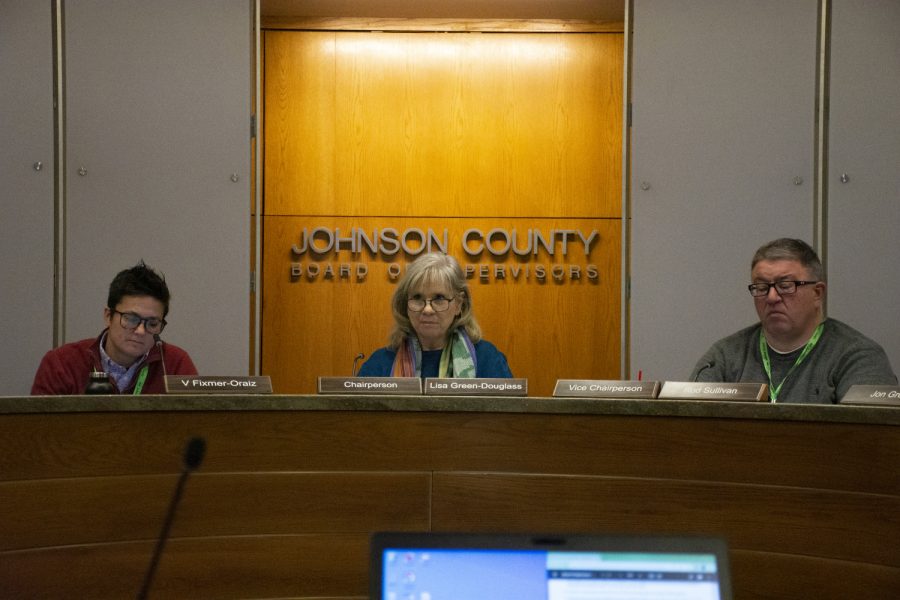New language accessibility program in the works for Johnson County
The program is currently in the preparation phase, where the county will be releasing surveys to determine where it is currently.
The Johnson County Board of Supervisors listens to speakers at a meeting in the Johnson County Administration Building on Wednesday, Feb. 15, 2023.
Alejandro Rojas, News Reporter
February 19, 2023
Non-English speakers in Johnson County will soon have access to a county services program that will address gaps in foreign language translation, it was announced on Feb. 15 in the Johnson County Administration Building.
The program is in the preparation phase, and surveys will be released to first identify what the needs of the county are regarding language translation accessibility.
It will address gaps in the county’s ability to serve non-English speaking populations by implementing tools and policies to assist departments. The county is currently unsure of what tools or policies it will use, but it will become clearer as more work is done.
The county currently does not have programs or tools to address language accessibility needs for its services. County workers interacting with non-English speaking populations rely on workers from other departments or on-demand services for translations.
The county will use a framework created by the Department of Justice titled “Language Access Assessment and Planning Tool for Federally Conducted and Federally Assisted Programs,” as explained by Johnson County’s Diversity, Equity, and Inclusion department on Feb. 15.
RELATED: Proposed salary increases for elected officials lowered by Johnson County Board of Supervisors
According to presentation slides included in Wednesday’s meeting, the county is working on the first part of the framework, conducting a self-assessment to gauge where the county is currently.
This will take on the form of surveys, Paola Jaramillo Guayara, Johnson County Diversity, Equity, and Inclusion coordinator, said.
Guayara added that the first survey was already released and was funded with $50,000 in American Rescue Plan Act money.
ARPA is a $1.9 trillion relief package intended to help U.S. communities financially harmed by the COVID-19 pandemic. Johnson County, with a population of roughly 150,000 residents, received $29.3 million in 2020.
Guayara said there’s no set timeline or end date for the surveys besides the deadline to use ARPA money. This will allow the county to take its time collecting as much data as needed to ensure its next steps are well-informed.
The next phase in the framework will be the policy phase. Guayara said the policies will determine how the county directs its language access program. She also said the policies will be adjusted to fit the needs of each department.
“We have so many departments and divisions that have different means that do different things. And so, what we want to do is create opportunities so that every department gets what they need,” Guayara said. “We want to create something that really creates that standard of customer service that, regardless of where [people are] going and what they’re doing, they know exactly what opportunities are available to them.”
Guayara said many departments have already been using temporary solutions to offer language accessibility.
The auditor’s office has been using an on-demand translation service that offers translators over the phone. Bailey Kelley, an elections technician for Johnson County, said her work with the community ID program sometimes meant working with applicants that do not speak English.
An important factor in the program’s rollout has been the support of the county supervisors, Guayara said.
Green-Douglass highlighted that while English may be the predominant language in the county, it was important to keep in mind the populations accessing county services may not speak it. “We’re excited to really develop something that is going to be long-term sustaining and that allows community members to feel welcome and safe and knowledgeable when they have any sort of interaction with one of the many tentacles that Johnson County has,” Guayara said.



